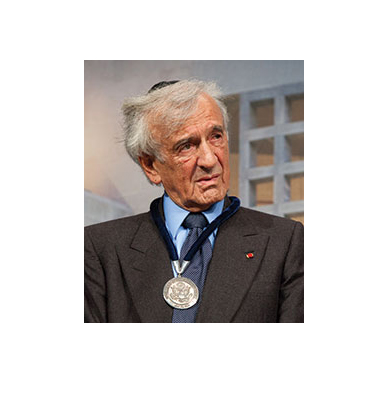
The U.S. Holocaust Memorial Museum conferred their highest honor, the Elie Wiesel Award, on the U.S. Department of Justice in recognition of the successes of its longtime enforcement program’s efforts to identify, investigate, and prosecute participants in World War II-era Nazi crimes.
That program, previously based in the former Office of Special Investigations (OSI), is now part of the mission of OSI’s successor unit, the Criminal Division’s Human Rights and Special Prosecutions Section (HRSP). The award was accepted by former OSI Director Eli Rosenbaum, under whose leadership most of the unit’s prosecution successes were achieved. Rosenbaum, who recently led HRSP’s investigation and prosecution of a Nazi concentration camp guard who was removed from the U.S., currently serves as HRSP’s Director of Human Rights Enforcement Strategy and Policy.
“It is deeply gratifying that the United States Holocaust Memorial Museum has recognized the Justice Department’s extraordinary work in pursuing justice on behalf of the victims of Nazi genocide,” said Attorney General Merrick B. Garland. “The Department remains steadfast in its resolve to pursue justice on behalf of victims of human rights abuses committed in a tragically long list of countries both during and since World War II.”
Also honored with the Eli Wiesel Award was Ambassador Stuart Eizenstat, former Chief White House Domestic Affairs Advisor under President Jimmy Carter, who was instrumental in the legislation that led to the creation of the U.S. Holocaust Memorial Museum and who led tireless efforts to secure compensatory and historical justice for survivors.
“While true justice for the victims of the Holocaust is not possible, Stuart Eizenstat and the U.S. Department of Justice’s Office of Special Investigations have each worked tirelessly in different ways to secure a measure of justice for the survivors and accountability for the perpetrators,” said Museum Chairman Howard M. Lorber. “We are honored to recognize their achievements and decades-long dedication to these noble pursuits.”
The OSI was established in 1979 to identify, investigate, and bring to trial people living in the U.S. who participated in Nazi crimes against humanity. Staffed by a dedicated team of prosecutors, investigators, and historians, OSI sought out Nazi perpetrators living in the U.S. who had entered the country illegally. Between its founding and 2010, when it was merged into HRSP, OSI’s investigations and prosecutions led to the denaturalization and/or removal or extradition of more than 100 Nazi offenders from the U.S. In addition, with the assistance of the Justice Department’s former Immigration and Naturalization Service—and since 2002, its successor, the Department of Homeland Security—OSI blocked more than 200 people suspected of participating in wartime Nazi and Japanese crimes from gaining entry to the U.S.
OSI documented and made public the details of U.S. intelligence agencies’ recruitment of such Nazi perpetrators as Klaus Barbie, known as “the Butcher of Lyon” for his torture of Jews and members of the French Resistance and the deportation of Jewish children to Auschwitz. It also denaturalized and deported, among others, John Demjanjuk, the notorious Sobibor extermination camp guard, and Arthur Rudolph, a wartime Nazi slavemaster and later a senior NASA official in charge of constructing the Saturn V rocket. OSI also performed the key investigative work, under Ambassador Eizenstat’s leadership, that proved that the Third Reich transferred Holocaust victim-origin gold to the Swiss National Bank during the war and helped achieve the declassification and public release of millions of pages of classified U.S. government records on Nazi criminals and their crimes.
Given that most Holocaust perpetrators are no longer alive, the principal focus of the human rights enforcement work of HRSP is now on modern human rights abusers. HRSP has prosecuted war criminals, persecutors and other human rights abusers from all over the world, including in relation to postwar conflicts such as those in Bosnia, Guatemala, and Rwanda.
Established in 2011, the Elie Wiesel Award recognizes internationally prominent individuals whose actions embody the Museum’s vision of a world where people confront hate, prevent genocide, and promote human dignity. Holocaust survivor, author, and Nobel Peace Prize laureate Elie Wiesel, the Museum’s founding chairman, was the first recipient of the award, which was subsequently named in his honor. Engraved on the award are words from Wiesel’s Nobel Prize acceptance speech, “One person of integrity can make a difference.”
In addition to the late Professor Wiesel, the 13 previous recipients include former Nuremberg prosecutor Benjamin Ferencz, the late Congressman John Lewis, and the Syrian White Helmets organization.


Chattooga Opinions
The Joy of the Journey: Can Christians Battle Depression?

Chattooga Public Safety
Most Recent Chattooga County Food Service Inspections

Chattooga Local News
Enroll Now: Chattooga Head Start Opens Registration for the New School Year!

Chattooga Local News
Chattooga County Seeking Volunteers to Join Emergency Response Team

Chattooga Outdoors
Have a Plan for Outdoor Adventures? Plan to be BearWise too!

Bulloch Public Safety
05/27/2025 Booking Report for Bulloch County

Bulloch Public Safety
06/09/2025 Booking Report for Bulloch County

Bulloch Public Safety
06/02/2025 Booking Report for Bulloch County

Bulloch Public Safety
05/19/2025 Booking Report for Bulloch County

Bulloch Public Safety
06/06/2025 Booking Report for Bulloch County





